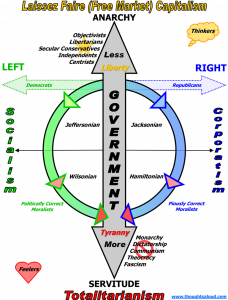 The Great Dichotomy
The Great Dichotomy
Sub-title: How can we have such a brilliant future while having no future at all?
Herein lurks a philosophical dilemma that should vex anyone who tries to apply rational analysis to our collective future.
On the one hand, we have the almost magical explosion of things scientific and technological. For instance, the technology of miniature electronics is advancing at such speed that one can hardly purchase, unpack, and deploy the very latest gadget before it is rendered obsolete.
Medical science and technology are curing diseases, mending broken body parts and extending human life to the point where it seems we may soon be able to live forever (a condition which, if ever realized, would be the beginning of the end of humankind – a topic I may blog on at another time).
Sci-tech advances in food production promise the ability to feed an endless swarm of our own kind.
And so on, and so on. Looked at from a purely sci-tech viewpoint, the future seems so bright we need to wear shades (or whatever that song actually said).
Yet, in lock step with all this sci-tech magic, we see a total breakdown of our several cultures as well as our social-economic systems. This is evidenced by the growing levels of dependence on central governments, the loss of individualism, both in ability and in personal liberty, and a pervasive spread of crippling ignorance which, left unchecked, will soon take much of humanity to the conditions that existed before the Enlightenment.
Obviously, these two movements, one toward the future and the other toward the past, are dividing the body politic into 2 major groups which I style the “makers†and the “takersâ€. As the gap between these groups widens, a stress will build up until something MUST happen. While I cannot describe exactly WHAT that thing that happens will be, I think I can safely predict that it will not be pleasant or desirable for anyone. What is even more frustrating, I see no realistic way to prevent things continuing on their present course.
There are those Pollyanna types who see such as me as hopeless cynics and who argue that what is good, what is desirable, will always prevail in the end. They might be surprised to learn that I actually do not disagree. The difference between we cynics and the Pollyanna types is that we tend to recognize that between that time we call “now†and that other time we call the “endâ€, there is a lot of potential for turbulence.
So, how might I answer my own question – “How can we have such a brilliant future while having no future at all?� Simple. By recognizing that both outcomes are equally guaranteed by the nature of our humanity.
If other of you have better ideas, I would beg to hear them.
Troy L Robinson

It is hard to disagree with your logic, Troy. Of course, you will recall my Dark Ages II essay, which I wrote about the time we met online among that nest of fools. 🙂
You probably also remember me saying a time or two, that one of the most profound assertions I have ever encountered, was that mankind had all the knowledge required to put a man on the moon within 100 years, back during the time of Aristotle. Then, the barbarians razed the libraries.
I reckon civilization will again emerge from our ashes, and begin anew. Knowledge is now so dispersed that surely the remnants of our civilization will have a head start, and not require another millennium or two to get back to modernity; although I would recommend that they not repeat the tragic errors we made in 1913. 🙂 â—„Daveâ–º
Speaking of the dispersal of knowledge… a couple of years ago, I read Intellectuals and Society by Dr. Thomas Sowell. While trying to explain the disadvantages of a ruling elite, Dr. Sowell noted that it is utterly impossible for a single individual, no matter how gifted, to have as much as 5% of all the knowledge available (and that most have far, far less). Yet, all of us taken together have ALL of the knowledge that exists.
What a wonderful argument in favor of valuing every individual (and for leaving them free to contribute what they will).
BTW, I thought it was the Christians who did most of the library burning? Or is that what you meant by barbarians?? Indeed, the wholesale destruction of accumulated knowledge is my primary complaint with organized religion. Given their way, they would keep the populace so ignorant that even God stories are believable.
Troy
Anyone who would burn a library to keep knowledge from others is a barbarian! â—„Daveâ–º
Even if such knowledge was clearly the work of Satan???
Don’t you realize that God wants you to remain an ignorant animal while only Satan would lift men up out of the herd?
Actually, I would have used “total idiot” but “barbarian” will do.
I have long posited that animals at the top of the intelligence ladder (presumably including humans) are, because of that intelligence, pretty much exempt from being the prey of lesser animals. Ergo, they must prey on each other.
Troy
It just occurred to me how similar are the words “prey” and “pray”. I wonder if that is more than coincidence?
Does one prAy not to become prEy? Does one prAy to an entity to whom one is prEy?
Prey/pray tell, I simply don’t know.
🙂
Precisely; I have often remarked that if given Adam and Eve’s choice between ignorant bliss in utopia, as long as they ask no questions, vs. the offer of knowledge and understanding, my inquisitive mind would have to go with the Devil’s pitch. 🙂 â—„Daveâ–º